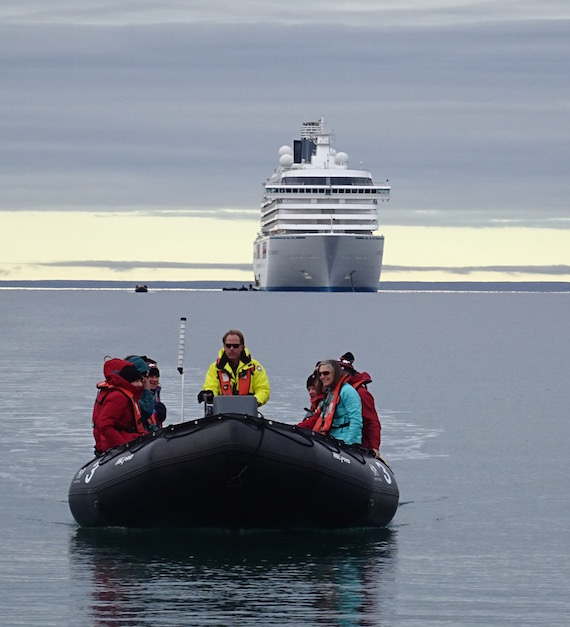Arctic cruise ship group introduces online assessment for staff
You need to watch out if you’re in a nesting area for Arctic terns: the small white birds can deliver serious blows with their sharp beaks when they dive-bomb you to protect their eggs.
But to protect yourself and the birds, there are several options—which one of the following options is the right one?
• A: Hold your hand (or a stick) steadily above your head and move away in the direction you came from.
• B: Proceed carefully and watch out for eggs and chicks on the ground.
• C: Swing a stick above your head.
This is an example of the kind of question asked in a new online assessment for Arctic field staff on cruise ship.
If you chose A as what you shouldn’t do if a tern flies at you, then you made a good choice, because your hand could also get injured and a stick could hurt the bird.

To make sure that Arctic cruise ships’ field staff in the Arctic make good decisions, which rely “on knowledge and competence,” the Association of Arctic Expedition Cruise Operators developed the new assessment, launched Jan. 8.
The Norway-based association, which describes itself as being “dedicated to managing environmentally friendly, safe and considerate cruise tourism,” represents the majority of cruise operators in the Arctic, with 70 international members.
These include Adventure Canada and Hurtigruten, which will start bringing in cruise ships to the Northwest Passage in 2018.
“We are extremely proud to take the Arctic expedition cruise industry and the AECO field staff to a new level of responsibility,” said Frigg Jørgensen, the associations’s CEO, in a news release.
“This is not a result of legal or governmental requirements; it is an initiative driven by our members—responsible operators with the objective to ensure sustainable and considerate tourism.”
The assessment is an online multiple-choice test, including 60 to 80 randomly chosen questions based on a pool of questions developed by a group of experts, the association said.
Some touch on the more than 30 community guidelines, developed by the association in 2017,which are mandatory for its members.
For example, the test asks you to select one of the following statements, which are not in accordance with those community guidelines:
• A: Engage the people and cultures with respect; an open mind leads to the best experiences.
• B: Talk about, and not to, the people you meet (not the right choice).
• C: Make an effort to understand and respect the idea that cultures can be different.
• D: Think of yourself as an ambassador for your country and culture, as the locals are for theirs. Politeness and good manners are always appreciated.
Guidelines also deal with a issues including environmental protection, general operations, site visits and wildlife.
“Field staff are not expected to know everything by heart, but they should know where to find the answers quickly,” Jørgensen said.
But to pass the assessment, staff need to get 80 per cent of the answers correct.
And if they pass, they will receive a certificate of achievement.
For the 2018 Arctic cruise season, the association has “strongly” encouraged all members to ask their field staff to take the assessment.